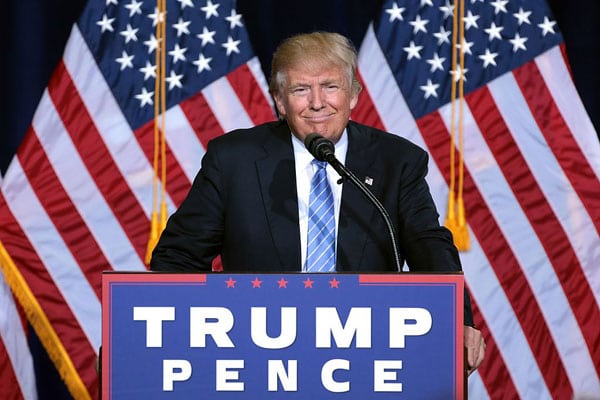
New York Attorney General Eric Schneiderman has now left the building, but among the ongoing initiatives being advanced by his office and successor, current NY AG Barbara Underwood, is the holding to account of the Donald J. Trump Foundation and its trustees, which include the president himself along with three of his children—Ivanka, Donald Jr., and Eric—who sat on the foundation’s board, a body that last met in 1999.
In a lawsuit that comes after a twenty-month investigation, Underwood cites many examples of “improper and extensive political activity, repeated and willful self-dealing transactions, and failure to follow basic fiduciary obligations.” As readers may recall, the NYAG had previously ordered the foundation to cease any fundraising in New York.
“Mr. Trump used charitable assets to pay off the legal obligations of entities he controlled, to promote Trump hotels, to purchase personal items and to support his presidential election campaign,” Underwood writes.
Underwood’s office is seeking to have Foundation dissolved with the remainder of its $1 million in assets being distributed to charity, that its trustees be enjoined from overseeing any other charity in the state, and that the foundation pay $2.8 million in restitution and penalties—approximately the amount which the Trump Foundation distributed to veterans’ groups in what the suit calls a related party transaction.
What this refers to, of course, is the fundraiser that that Trump decided to throw for veterans’ groups in early January 2016. Trump claimed at the time that $6 million had been raised, but only a little more than $2.8 million went into his foundation, with the rest being contributed by donors more directly. (NPQ reported on the experience of Liberty House, one such organization.) Trump then integrated the awarding of checks into his campaign almost completely. It is this use of the foundation as a campaign tool that the suit spends the most time documenting, providing a detailed peek into the lack of boundaries between the campaign and foundation, with campaign staff apparently not only deciding who was to get the money but at what political events the presentation of checks would occur. According to the suit, Trump himself said the following at a rally on February 1, 2016:
In lieu of the [Republican presidential primary] debate, I said let’s have a rally for the veterans….At that rally, we raised in one hour six million dollars…. So what we did, we raised this money, and we are giving it out, and we just gave out a check for a hundred thousand dollars a little while ago, and we are giving out another check, and they can bring it up and we are going to deliver it right here….We have so many of these checks. They are all over the place. We are giving them out. This was in lieu, and, by the way, the poll numbers just came down from New Hampshire, I went through the roof. I think they respect the fact that I, that we stand up for our rights….So, congratulations to Mulberry Street.
Thus, not only did Trump freely mix the affairs of his charity and the campaign, he did so quite openly. Did he not know this was disallowed, or did he just not much care?
The suit charges that Trump was clearly aware, asserts the suit, of the prohibitions on his foundation’s involvement in campaign and partisan political activities.
Mr. Trump’s wrongful use of the Foundation to benefit his Campaign was willful and knowing. Mr. Trump was aware of the prohibition on political activities and the requirement of restrictions on related party transactions. Among other things, he repeatedly signed, under penalties of perjury, IRS Forms 990 in which he attested that the Foundation did not engage in transactions with interested parties, and that the Foundation did not carry out political activity.
Sign up for our free newsletters
Subscribe to NPQ's newsletters to have our top stories delivered directly to your inbox.
By signing up, you agree to our privacy policy and terms of use, and to receive messages from NPQ and our partners.
Mr. Trump also signed, again under penalty of perjury, the Foundation’s Certificate of Incorporation, in which he certified that the Foundation would not use its assets for the benefit of its directors or officers and that it would not intervene in “any political campaign on behalf of any candidate.”
In addition, in February 2016, while on the campaign trail, Mr. Trump spoke out against the prohibition on charities participating in political campaigns. Mr. Trump was again alerted to the prohibition on political activity no later than March 22, 2016, the date that the initial public reporting of the Foundation’s unlawful donation to the political committee for Florida Attorney General Pam Bondi. The very next day, the Foundation filed an IRS Form signed by Mr. Trump, disclosing the “And Justice for All” transaction detailed below, and Mr. Trump paid federal excise tax for making an impermissible political expenditure and reimbursed the Foundation for that expenditure.
But the suit also faults the trustees for a lack of care in just about every aspect of the foundation, from observing prohibitions against self-inurement to a lack of any investment policy. The charity was used to settle legal disputes and to pay debt among other things. Essentially, asserts the AG, the foundation was just a private checkbook for the candidate filled with other people’s money.
The suit does not focus only on the chaos of the veteran’s charity scandal, covered extensively at the time by NPQ (see here and here), citing also the $25,000 contribution to Pam Bondi’s campaign for Florida attorney general (the contribution he claimed was a kind of clerical error) and many other questionable uses of the charity with campaign and business employees, as well as friends and family cast as unquestioning sidekicks. As David Fahrenthold of the Washington Post reports in one distressing revelation:
A New York state investigator asked Allen Weisselberg who was listed as treasurer of the Trump Foundation—whether the foundation had a policy for determining which specific payments it was allowed to make.
“There’s no policy, just so you understand,” Weisselberg said.
The interviewer asked whether Weisselberg had understood that he was actually on the board of the Trump Foundation and had been for more than a decade.
“I did not,” he replied.”
The Attorney General’s office has also “referred its findings and concerns to the Federal Election Commission, the US Department of Justice, and the IRS for their review and possible action.” Meanwhile, Trump has tweeted, “I won’t settle this case!” Of course, Trump has settled a number of other actions related to his misuse of the foundation.












